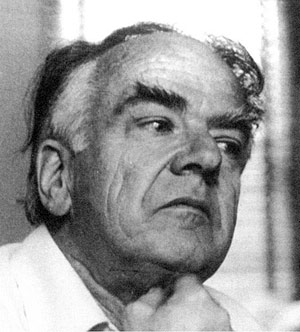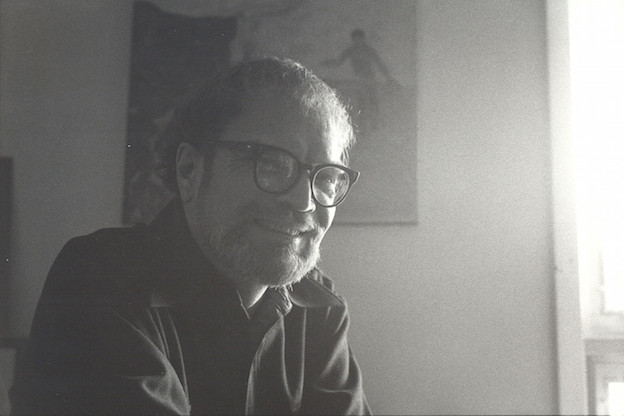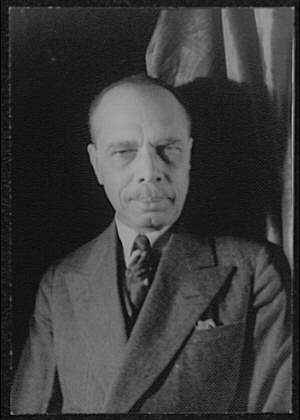|
|
Posted 11/3/2014 (link)
 Our newest author page is for the multifaceted author Lonely Christopher. It's home to two recordings that give listeners a glimpse of his diverse talents.
The more substantial of these recordings comes from the High Volumes Radio Show, hosted by Joelle Jameson, and was broadcast on July 5th, 2010. It includes a lengthy interview along with Jameson, along with Lonely Christopher reading the poems "Magic Bridge," "How Do You Know This Is For Real?," "Anselm Berrigan," and "Grown-Ups," work by John Ashbury, Gertrude Stein, and Walt Whitman, and a variety of music from Leonard Cohen to Philip Glass. That's followed by a 2011 Segue Series set at the Bowery Poetry Club that includes the poems "Year of the Great Massacre," "Anselm Berrigan," "Modern Marvels," "The Table (After Gertrude Stein)," and "For Example," among others.
Posted 11/5/2014 (link)
 Thanks to John Whiting, we're able to share two new recordings from British poet and critic Eric Mottram, and American philosopher Stanley Cavell.
First up we have Mottram's appearance on KFPA-FM, recorded on November 2, 1982, which includes an extensive interview with Erik Bauersfeld, followed by a lengthy reading (running nearly an hour). That's just one of many recordings on our Eric Mottram author page, including a 1976 reading at Foster Clough in Hebden Bridge, a 1984 Segue/International Committee for Poetry event in NYC, and two recordings from SUNY-Buffalo in 1992: a September 23rd reading and a November 2nd conversation with Robert Creeley.
Our second new recording is also Mottram-related: Stanley Cavell's lecture, "Identifying Praise: in Moments of Henry James & Fred Astaire," which was given in 1998 at King's College in London at the opening of the Eric Mottram Archive. On our Stanley Cavell author page, you'll also find a 2012 Close Listening program with Charles Bernstein and a 1992 talk at SUNY-Buffalo on "Authority, Tradition and the Future of the Discipline," along with selected external video links.
Posted 11/7/2014 (link)
 Our latest addition to Ron Silliman's formidable author page is a 2014 BookThug interview with the poet concerned with his latest book, Revelator, which the press released in October 2013.
Points of discussion include Revelator's place within Silliman's larger project, Universe, its relationship to some of the poet's other endeavors (in terms of both form and sources), the meaning of the book's title and the origins of its cover image, the need for poets to serve as witness to contemporary events, the place of systems within his writing process, and his impetus for beginning a 360-section poetic sequence in his retirement, among other topics.
You can watch this twenty-minute video along with many more video and audio recordings from 1978 to the present on PennSound's Ron Silliman author page.
Posted 11/9/2014 (link)
 We'd like to send out birthday wishes to Lewis Warsh, the prolific author and influential editor who turns seventy today!
PennSound's Warsh author page is home to a wide array of recordings spanning four decades, from Warsh's 1978 appearance on Public Access Poetry with then-wife Bernadette Mayer to a 2008 Chapter and Verse reading in Philadelphia with Brian Carpenter and yours truly. In-between, you'll find four Segue Series sets (readings at the Ear Inn from 1979, 1982, and 1996, along with a 2005 event at the Bowery Poetry Club), plus recordings from the Line Reading Series, Radio Poetique's Poetic Brooklyn, POG Sound, and The World Record: Readings at the St. Mark's Poetry Project, 1969-1980. There's also Warsh's contribution to a 2006 Barbara Guest Praise Day Tribute at the BPC, and the complete audio and liner notes from the 2004 Deerhead Records and Ugly Duckling Presse CD release of The Origin of the World — a start-to-finish reading of Warsh's famous long poem of the same name — recorded at New York's Parkside Lounge in 2002.
To start listening, click the title above to be taken immediately to PennSound's Lewis Warsh author page.
Posted 11/12/2014 (link)
 Here's a short yet marvelous reading by John Wieners reading at the St. Mark's Poetry Project on April 25, 1990, which was recently added to our archives. It's as interesting for Wieners' selections from his own work as for the readings from other authors that make up most of the set.
After a lavish introduction, Wieners begins his set with a few pieces by friends: first a pseudonymously-published poem by "his houseboy," "Heroin, An Ode," then work from "a kid from Chicago called Persky, whom I shared a tenement flat with [from] 1959 to 62" — Stan Persky's novel, Buddy's: Meditations on Desire — then finally, Allen Ginsberg's "Elegy for Neal Cassady." He then solicits requests from the audience and reads "Act #2 (For Marlene Dietrich)," "The Acts of Youth," and "Confidence." Despite the audience's pleas for an encore, and the fact that Wieners' fellow reader for the evening, Peter Orlovsky, hadn't yet shown up, the recording ends there.
If you're in the mood for more of Wieners' work, however, you're in luck, since PennSound's John Wieners author page is home to a great many recordings of the legendary poet, from a number of 1965 readings through to a 1999 appearance at the Guggenheim.
Posted 11/14/2014 (link)
 If, like many of us, you've been captivated by Claudia Rankine's latest, Citizen: An American Lyric — recently nominated for the National Book Award alongside some stiff competition — then you'll be very excited to listen to this newly-added recording of the poet's appearance on Between the Covers, a literary radio program broadcast by KBOO-FM in Portland, Oregon.
Sitting down with host David Naimon for a full hour, Rankine discusses the book from practically every angle: the project's inception and composition; the relationship between text and imagery within Citizen; the role of Graywolf Press in bringing her ideas to fruition; the influence of her collaborations with her husband, filmmaker John Lucas; Citizen's relationship with her previous book, Don't Let Me Be Lonely; what current events, like President Obama's birth certificate, didn't make it into the book; and the continuing resonance of the book's perspectives on American race relations, including Rankine's recent visit to Ferguson, MO. It's truly a fascinating listen, serving as a good introduction to the book for folks who haven't yet read it, while those who have will want to go back to the text once more.
Posted 11/18/2014 (link)
 Poet Kenneth Irby was born on this day in 1936, and just in time to celebrate, Jacket2 has just launched a massive new feature on the poet's life and work, curated by William J. Harris and Kyle Waugh.
"On Kenneth Irby" originated with a November 2011 colloquium held in Lawrence, Kansas to mark the poet's seventy-fifth birthday. All of that conference's participants — Lyn Hejinian, Pierre Jorris, Ben Friedlander, Denise Low, and Joe Harrington — are featured here, and their essays are joined by work from Robert Bertholf, Robert Grenier, Dale Smith, Matthew Hofer, Aldon Nielsen, and Andrew Schelling, along with a poem by Nathaniel Tarn, recollections by former students of Irby's (Waugh, Cyrus Console, Peter Longofono, Jeff Bergfalk, and Monica Peck), and a chronology by Waugh.
That's already a formidable feature, but "On Kenneth Irby" also includes two substantial sub-features. The first contains nineteen poems by Irby written between 1959 and 1972, which are either previously unpublished, or "reprinted here for the first time since they initially appeared in literary journals of modest distribution during the 1960s and early 1970s." The second collects twelve letters from Irby to Ed Dorn, written between 1963 and 1974.
Taken together, these materials serve as a fitting tribute to "a distinguished innovative poet," as Harris writes in his intro, who "has recently become better known, [but] deserves to be much better known than he presently is." "Since Ken Irby should be ranked with such contemporary figures as Amiri Baraka, Robert Creeley, Lyn Hejinian, Ed Dorn, Robert Duncan, and Rae Armantrout," he continues, "I hope this feature will cause a bit of a stir, and help introduce this important poet to a larger audience. This audience needs this gentle but commanding presence."
Posted 11/24/2014 (link)
 This past September, the Electronic Poetry Center celebrated its twentieth birthday with two days of readings, talks, and performances by poets who've had a close affiliation with the site. Today we're able to make recordings of the majority of those events available for your listening pleasure.
Thursday, September 11th began with an afternoon session that included talks by Steve McCaffery, Danny Snelson, Laura Shackelford, cris cheek, Elizabeth Willis, and Loss Pequeño Glazier. Evening performances followed in two sets: the first featuring Tammy McGovern, Snelson, and Wooden Cities with Ethan Hayden; the second with Joan Retallack, cheek, and Tony Conrad.
Friday, September 12th began with afternoon readings and talks by Myung Mi Kim, Retallack, Charles Bernstein, and a panel talk featuring Bernstein, Glazier, Jack Krick, Shackelford, and Snelson. The celebration concluded with evening performances from Glazier, Willis, and Bernstein.
Posted 11/26/2014 (link)
 Chris Mustazza is back from the archives, this time with a new author page for James Weldon Johnson, a key figure in the Harlem Renaissance and former leader of the NAACP. Here's Mustazza's description of the project:
These recordings of James Weldon Johnson were made on December 24, 1935 at Columbia University and are part of a larger collection of recordings known as The Contemporary Poets Series. Johnson is the only African American poet in the series, which ran from 1931 through the 1940s. The addition of the Johnson recordings to PennSound is crucial for a number of reasons, one of them being the function of Johnson's poetry as an ethnographic preservation of culture through the transduction of the sounds of language.
The first two recordings in the collection, "The Creation" and "Go Down Death," both from Johnson's 1927 collection God's Trombones, seek to preserve the sounds of African American folk sermons of the early 20th century. Johnson's poetics in the introduction to God's Trombones speaks extensively about how these poems are a visual representation of the sounds of the preachers of the sermons, a kind of musical score and libretto. He works to represent the cadences of these dynamic sermons through punctuation and lineation, with em-dashes representing a pause longer than a comma, and line breaks an even longer pause. In this regard, Johnson's work serves as a kind of proto-Projective Verse: he scores these poems for sonic representation. As such, the addition of the recordings to PennSound allows us to hear firsthand the poems as Johnson heard them when he composed them. And, in doing so, Johnson's vision of preserving the sounds and cultural significance of these sermons for posterity is realized.
The poems from Johnson's 1917 collection of poems, Fifty Years and Other Poems, are also sonic representations and cultural preservations. For example, Johnson's use of dialect poetry in some of the poems is a representation of speech sounds. By the time of these recordings, Johnson had spent a significant amount of time thinking about the aesthetic effects of writing dialect poetry, during which time he renounced the practice, and here returns to it (perhaps after being convinced of the the value of dialect poetry by Sterling A. Browns's 1932 collection of poetry, Southern Road). Johnson deftly uses dialect to great aesthetic effect, especially in "Sence You Went Away," a poem that creates a slippage between the dialect for "since" and the sound of "sense" (i.e. which could be read as "Sense, you went away"). Here, too, Johnson's poetry and poetics prefigure aesthetic movements of the later 20th century.
This very important collection is publicly available here in PennSound for the first time ever. For this, we thank Jill Rosenberg Jones and the James Weldon Johnson estate for their permission to distribute the recordings, as well as the staff at the Columbia University Rare Book and Manuscript Library for their assistance in digitizing these materials. Thanks, too, to the Penn Digital Humanities Forum for supporting a project that made these digitizations possible. I hope you will enjoy listening to these recordings.
|
PennSound Daily archive
2025
2024
2023
2022
2021
2020
2019
2018
2017
2016
2015
2014
2013
2012
2011
2010
2009
2008
2007
|








